Skills Boost: Useful communications strategies for LGBTI groups: Take it to the next level

At this session, Simona Mursec from Ljubljana Pride (Slovenia) shared the experience of developing several separate communications strategies for different areas of work and updating them.
We covered:
- Does an organisation need more than one comms strategy, and what to do if the answer is yes?
- How did Ljubljana Pride approach this challenge, and what did they learn?
- Why update a comms strategy and how to do it in a smart way?
Here are our top 9 quotes from this session check them out and see if the recording of the session might be a good match for you!
1. A communications strategy gives us a ready-made answer to requests like “please put this on social media”
“A comms strategy gives us the strategic framework for what we share, which channel is appropriate to share information from other organisations, and how we enhance our own audiences by cooperation with other organisations”.
2. Beware of Consultants bringing their own processes, especially private-sector consultants who mostly work in very different contexts
“I involve people that can support the processes. I am not a big fan of consultants when the role of the consultant is to come in with a model, a theory or their own way of doing things. Because most of the time it will not work for us. We have to develop our own model, approach, thought, commitment, and ownership of it.
I am more of a fan of people who can facilitate a process, who can take time to understand organisational needs rather than coming in with their own way of doing communications. For consultants it can be rather a game, and for us it’s not. This is our life.”
3. Everything comes with experience
“It took us a long time until we were able to invest into an organisational strategy. Once we had the organisational strategy, everything else went much faster, it was much clearer why we needed it, and how we could work with it. We built the muscle for it, then it was easier and less resource-intensive or time-intensive”.
4. Primary and Strategic audiences for Ljubljana Pride
“Our primary target audiences are LGBTI+ young people (15-29), the LGBT+ community in Slovenia, allies of LGBT+ community in Slovenia, allies and LGBT+ activists from abroad and young activists. And our strategic audiences are Slovenian media, LGBT+ influencers, LGBT+ organisations and initiatives and other activists’ organisations and groups.”
5. Sustainable funding is still one of the biggest challenges
“One of the most important resources for an organisation are trained staff members and volunteers. And by trained, I mean people with enough political, content, personal and other kinds of capacities. It takes money to attract, support and train, to build the capacity of your team. ILGA-Europe’s communications grant was the first grant ever we could use to pay comms staff. Most of the time it is a puzzle”.
6. Don’t make your cycles fit funding – decide strategy and then get creative to find funding to fit.
“I never connect organisational development and strategic development to funding. For me, funding is a tool. We decide at our own pace what our work is going to be. We decide what we are going to do, what are our strategic priorities and how we are going to do it, and then we find funding for that”.
7. Strategic choices do not always work in real life
“We spent some time trying to figure out how to use TikTok best. On the one hand, it is a great tool, and we got good outreach and a lot of visibility among young people, which is our target audience. But it also creates a lot of hate. So theoretically we would like to have it as a two-way communications channel. However, it is managed by volunteers and by young people themselves, and we don’t have the capacity to support them enough. So, for many years we have had to keep the comments closed. Strategically it should not be this way. But practically, it is the way it is.”
8. I would love everybody to have a printout on the wall
“I would love everybody who is doing content work to have a printed document on the wall, and once a week to have a glimpse to think how to incorporate our objectives into the work next week. But life doesn’t work like that, and people don’t work like that. So, we review strategies periodically, every three months. And if you do it this way, you can still clean up and make sure that nothing is forgotten. If you do it once a year, you probably have a problem”.
9. We often don’t have a choice to communicate or not – so we should structure it
“You might be an organisation that works more with internal audiences. You might not be as publicly politically exposed, but you almost certainly still need to communicate. We cannot escape it, we can still be dragged into because of the very hostile environment. So, we prefer to invest and to be more strategic and structured, so we know how to capitalise on it, how to respond, and how to build public pressure”.
You might like to check out some of our other communications resources:
- Useful communications for LGBTI activists: (Skills Boost recording): Click here
- Communications Strategies for Small Organisations (The ILGA-Europe Hub): Click here
- 9 Steps to a Good Communications Plan (The ILGA-Europe Hub): Click here
Do you struggle with some specific communications challenge, and do not know where to start? Reach out to us, we might be able to help! Contact svetlana@ilga-europe.org
Skills Boost: Useful communications strategies for LGBTI activists

We covered:
- What is a communications strategy? (and how is it different from ‘strategic communications’?) What is the point of it?
- What is the minimum that any communications strategy should cover, and what is the menu of options if one wants to be a bit more ambitious?
- Hearing from two LGBTI organisations who have gone through a communications strategy process recently – and what they learned from their experience. Check the experience of the Newcomers project (Sweden) and Transakcija (Slovenia)!
You might want to check other comms resources by ILGA Europe:
- 9 Steps to a Good Communications Plan (Hub card):https://hub.ilga-europe.org/communications/9-steps-to-a-good-communications-plan/ know where to start? Reach out to us, we might be able to help! Contact svetlana@ilga-europe.org.
- Useful communications for LGBTI-activists: take it to a new level (SkillsBoost recording): https://www.youtube.com/watch?v=YX3U-4KG5xY
- to be published Communications Strategies for Small Organisations (a Hub card): https://hub.ilga-europe.org/communications/communications-strategies-for-small-organisations/
Do you struggle with some specific communications challenge, and do not know where to start? Reach out to us, we might be able to help! Contact svetlana@ilga-europe.org
Our submission to the EC 2024 Rule of Law report
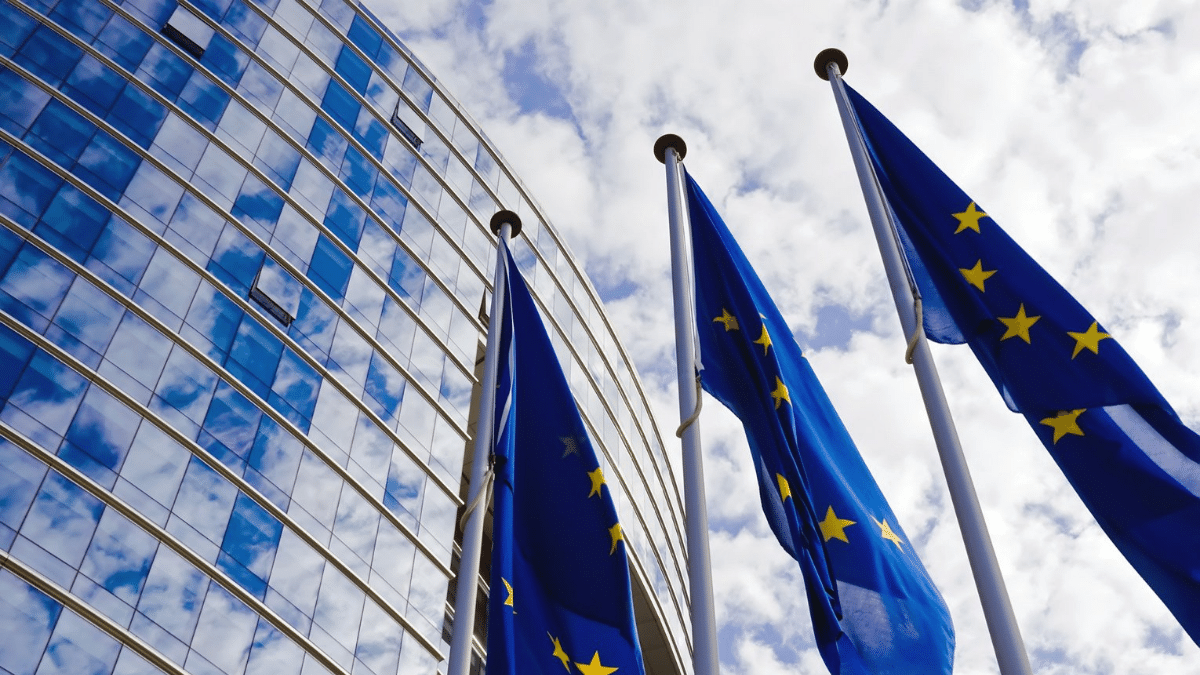
Over the past few years it has become increasingly clear that many government-led violations of LGBTI rights in EU Member States go hand-in-hand with an undermining of the rule of law and democracy. This includes in particular the degradation of the independence of judicial systems and the media landscape.
Particularly stark among this year’s submissions is the continual problem of non-implementation of European court judgments, especially around the right of LGBTI people to respect for their private and family life and the best interests of their children, as well as judgments related to legal gender recognition.
Efforts by authorities to restrict civic space; legal harassment, threats, hate speech and smear campaigns against LGBTI human rights defenders; and inadequate implementation of hate crime and anti-discrimination laws also remained prominent in 2023.
Slovenia about to make a crucial step towards equality for LGBTIQ+ people
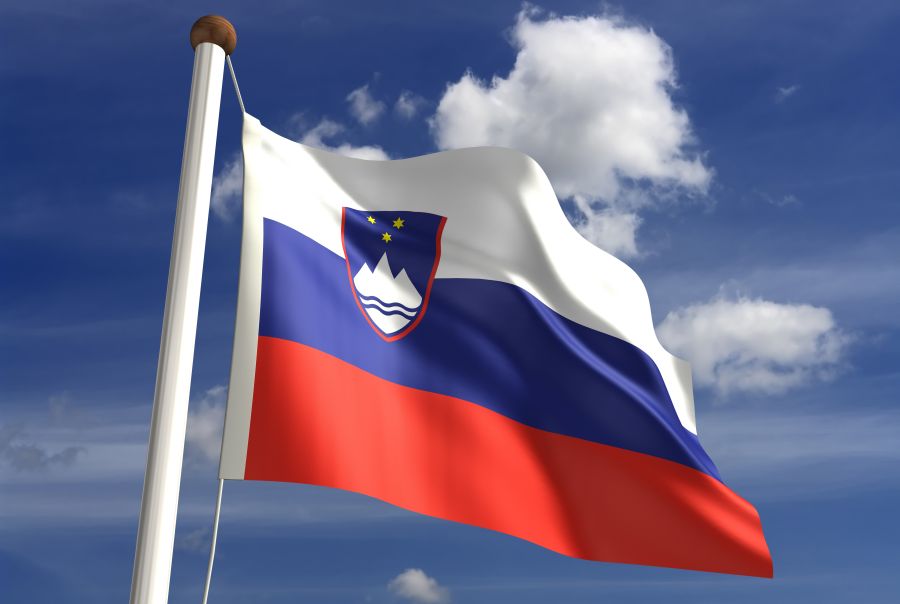
Today at a conference in Ljubljana, organised by Europe’s leading LGBTI organisation, ILGA-Europe, Slovenia’s State Secretary at the Ministry of Labour, Dan Juvan, committed to the next steps in preparing the National Strategy for the Equality of LGBTIQ+ Persons.
Today, October 27, marks a significant step forward in the journey toward equality and inclusion for the LGBTIQ+ community in Slovenia.
At a press conference during the ILGA-Europe Annual Conference in Ljubljana, which brings together hundreds of LGBTI activists from 54 countries in Europe and Central Asia, Slovenia’s State Secretary at the Ministry of Labour, Dan Juvan (MDDSZEM), further committed to the preparation and publication of the country’s first national strategy for LGBTIQ+ persons.
“Homophobic and transphobic violence exists and remains; individuals do not feel safe. That is why I am here, representing the ministry and the Levica party, to commit ourselves to addressing this issue. In the end, it is crucial that we discuss specific policies and measures to identify problems and find solutions,” State Secretary Juvan said.
This further commitment comes after the Ministry of Labour, Family, Social Affairs, and Equal Opportunities was directed by the Parliamentary Commission for Petitions, Human Rights, and Equal Opportunities last July to prepare and adopt the National Strategy for the Equality of LGBTIQ+ Persons in Slovenia in 2024.
Slovenia has made progress in safeguarding LGBTI rights, but challenges persist, particularly in areas concerning legal protection, education, healthcare, and overall social security. The urgent need for a comprehensive National Strategy for the Equality of LGBTIQ+ Persons in Slovenia is underscored by the rise in anti-LGBTIQ+ rhetoric and physical violence against LGBTIQ+ people in the country.
Over the next 14 months, the Slovenian government has committed to engaging in extensive consultations with civil society representatives and relevant institutions across various sectors. These consultations will form the foundation of our National LGBTIQ+ strategy and action plan, ensuring that it is effective and reflective of the diverse needs of the community.
Also in attendance at the press conference was Head of the Slovenian Equality Body, Miha Lobnik.
“In Slovenia, we have committed to implementing systematic anti-discrimination policies,” Lobnik said. “However, we lack a central focal point that systematically addresses minority issues, aligning with both national and EU commissions’ expectations.
“The government must take responsibility for systematically and effectively addressing minority concerns. Today’s discussion was a chance to focus on this area. I have called on governments twice before, and now this government faces the challenge of actually following through. A clear plan and concrete steps are crucial.
According to Katja Štefanec of Ljubljana Pride Association: “We recognise the crucial roles of both our Ministry of Education and Ministry of Labour in this process and are actively seeking cross-sectoral cooperation with various stakeholders, as we aim to enhance the impact of the strategy across diverse areas of influence and change-making efforts.
“We look ahead to 2024 with big expectations and will work closely with those responsible for the creation of a create a strategy that will enhance the protection of LGBTIQ people’s human rights in Slovenia and create a more inclusive, accepting society for all.”
ILGA-Europe’s Advocacy Director, Katrin Hugendubel added: “Over the past few years, we have seen a stark rise in the levels and severity of anti-LGBTI hate and violence across Europe. In this context and at this moment in time, we very much welcome the political commitment of the Slovenian government to develop a national action plan to tackle LGBTIQ+ discrimination by the end of 2024. We echo the call of national LGBTIQ+ organisations that they are involved in the development of the plan over the next 12 months. Their close involvement is essential, as they know the realities of the needs of the community this plan will address.”
Our submission to the EC 2023 Rule of Law report
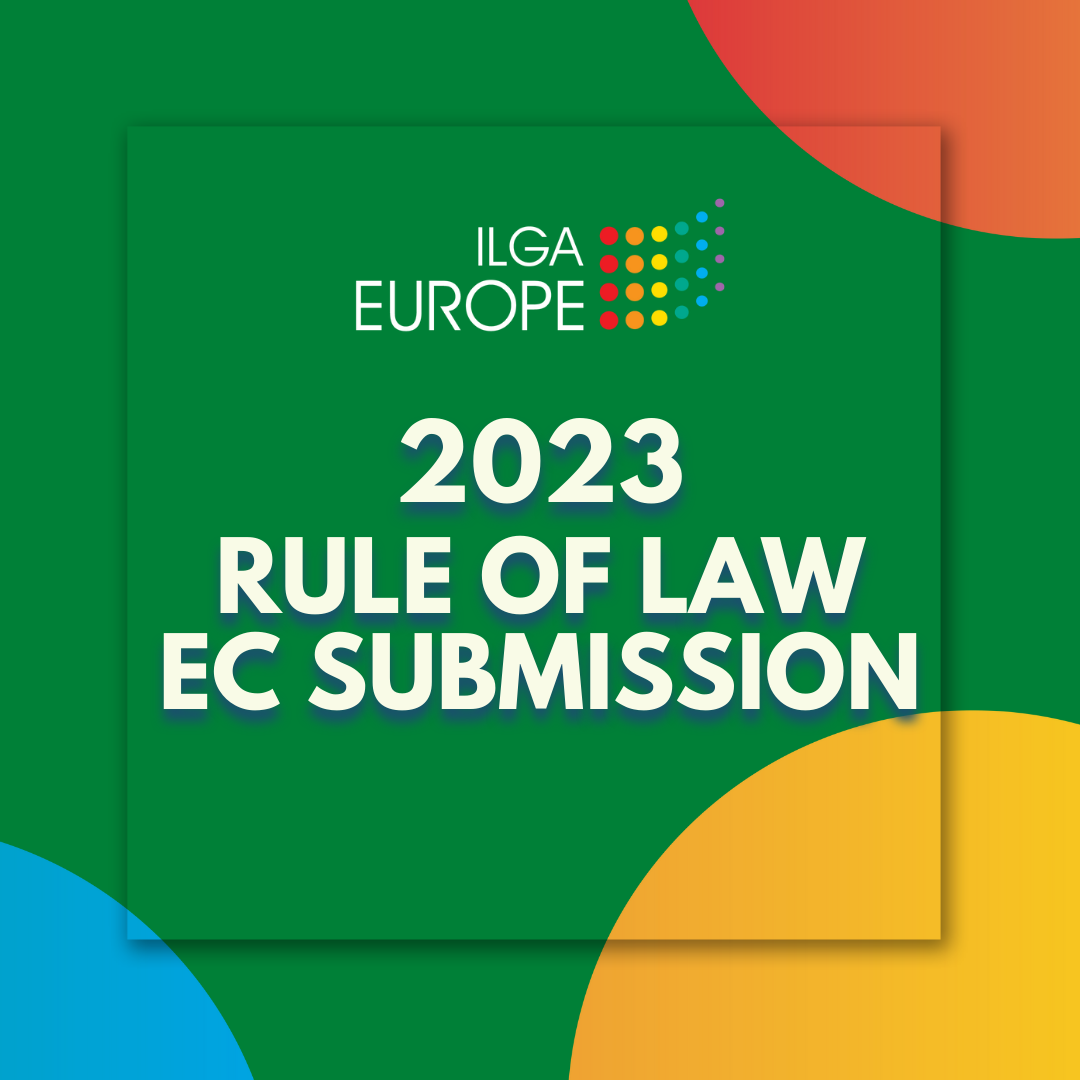
The submission covers developments in eight EU Member States as regards rule of law developments in the countries which have had an impact on the fundamental rights of LGBTI people and their democratic participation, with a focus on the past year (2022).
We have kept our inputs relevant to the content asked for by the consultation, and therefore we have not included all fundamental rights violations against LGBTI people, or all restrictions experienced by LGBTI civil society in the respective countries. We have only included them where there is a clear link to the issues of rule of law contained in the consultation.
Notably the submission covers the following topics:
- Manipulation of judicial processes to attempt to erode the human rights of LGBTI people and their access to justice;
- Politicians attempting to discredit and delegitimise the rulings of courts that uphold the rights of LGBTI people;
- Harassment and intimidation of LGBTI human rights defenders by law enforcement/prosecution services;
- Smear campaigns and negative narratives against LGBTI people, particularly where independence of media is threatened;
- SLAPPs against activists or journalists reporting on topics of public interest related to LGBTI;
- Censorship of LGBTI content;
- Tabling and adoption of laws aiming to reduce fundamental rights of LGBTI people;
- Tabling of laws aimed at restricting the functioning of civil society organistions;
- Arbitrary application of Covid-19 regulations to attempt to restrict the freedom of assembly of LGBTI people;
- Continued non-implementation of CJEU or ECtHR judgements which would improve the lives of LGBTI people;
- Anti-LGBTI discriminatory speech from political and religious leaders affecting public perception of LGBTI CSOs and creating an unsafe climate for LGBTI human rights defenders;
- Insufficient implementation of legal protection (e.g. protection against hate crime) for LGBTI people by responsible services, sometimes including Ombudspersons.
Annual Conference 2023: Location Announcement

As we get ready to travel to Bulgaria for the ILGA-Europe annual conference in Sofia this week, we’re delighted to announce that the city for next year’s conference has been chosen.
The 24th Annual ILGA-Europe conference will take place in the Bulgarian capital of Sofia this week, from October 19-22, where 350 participants, alongside our staff and board members, will attend workshops, plenaries and activities all under the theme, ‘Shaping the World to Come’.
Excited as we are to be meeting with activists again in person, after a two-year hiatus, we’re also delighted to announce that the Slovenian capital of Ljubljana, in the heart of Central Europe, has been chosen as the location for our Annual Conference in 2023.
We’re looking forward to beginning our work with LGBTI host organisations in Ljubljana to organise the 25th ILGA-Europe Annual Conference, and we’ll be announcing the exact dates as soon as they are tied down.
In the meantime, we look forward to being with our host organisations in Sofia – Bilitis, Deystvie and Glas Foundation – to share the energy, connection, learning and laughter of the ILGA-Europe annual conference once more!
Our submission to the EC 2022 Rule of Law Report
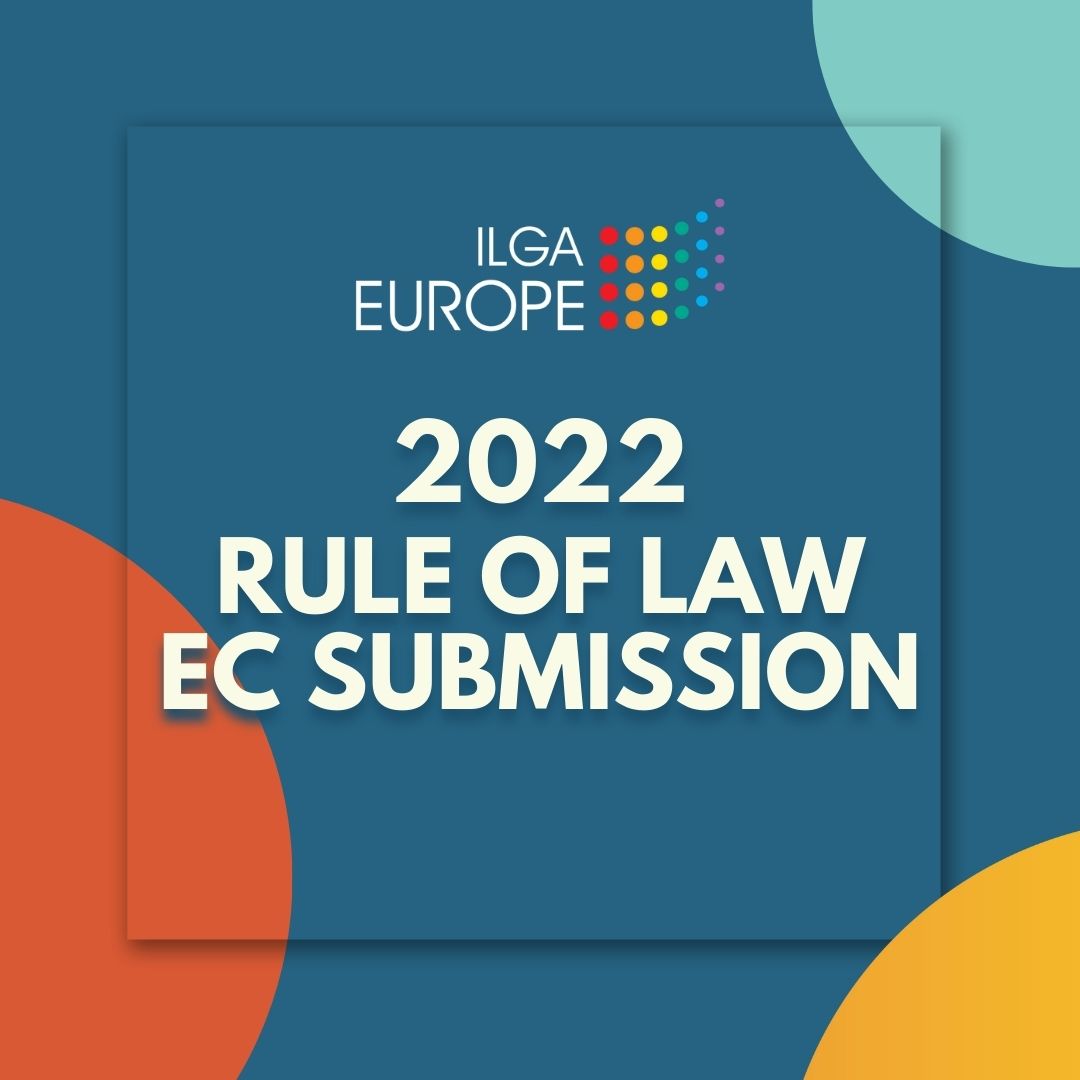
Expert contributions were provided by organisations PROUD (Czech Republic), LGBT komiteen (Denmark), Inter-LGBT (France), Háttér Társaság (Hungary), KPH & Atlas of Hate (Poland), ACCEPT (Romania), and Legebrita (Slovenia).
The developments encompassed in the submission point to systematic attacks on the fundamental rights of LGBTI people enabled by the weakening of rule of law and democratic structures. We have not included all fundamental rights violations against LGBTI people, or all restrictions experienced by LGBTI civil society in the respective countries, only those which are relevant to the respective headings of the consultation, where there is a clear link to rule of law.
Notably the submission covers the following topics:
- Political interference or bias in court cases related to LGBTI rights, in particular where independence of the judiciary is under attack;
- Anti-LGBTI bias, smear campaigns and censorship of LGBTI content, in particular where media freedom is under attack;
- Funding restrictions or discriminatory distribution of public or EU funds, affecting LGBTI organisations;
- Arbitrary application of Covid-19 regulations to attempt to restrict the freedom of assembly of LGBTI people;
- Covid-19 emergency measures affecting the process of preparing and enacting laws (exclusion of LGBTI CSOs in consultation phases or even fast-track adoption of legislation directly attacking LGBTI people);
- Non-implementation of CJEU or ECtHR judgements which would improve the lives of LGBTI people;
- Judicial harassment of LGBTI activists (in particular SLAPPs);
- Insufficient follow-up of anti-LGBTI hate crime cases;
- Anti-LGBTI discriminatory speech from political and religious leaders affecting public perception of LGBTI CSOs and creating an unsafe climate for LGBTI human rights defenders (in some cases leading to attacks on CSO offices, employees and volunteers).
Meeting the challenge of accession
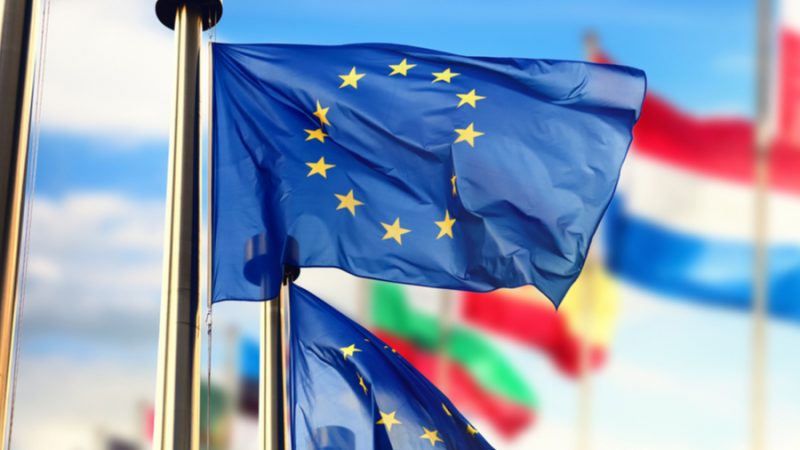
Surveys on sexual orientation discrimination in countries joining the European Union.
This report is a comparative summary of national reports written in ten countries (Czech Republic, Estonia, Hungary, Latvia, Lithuania, Malta, Poland, Slovakia, Slovenia and Romania). It highlights the violence and discrimination some people face because of their sexual orientation.
The data and statements collected show that discrimination on grounds of sexual orientation affects several areas of the life of lesbian, gay and bisexual (LGB) people. Discrimination exists in the family, in education, in the workplace, in the army, in health services, in housing and in the church. In order to end such discrimination and human rights abuses, the report puts forward some recommendations to the new member states and to the European Union institutions.
These recommendations concern changes in the law, policies and practices affecting LGB people in the accession countries. It aims at reinforcing the instruments dealing with discrimination in the EU and in the member states.
Equality for lesbians and gay men- a relevant issue in EU accession process

This report, from 2001, maps the legal and social situation of lesbians and gay men in 13 candidate countries to EU accession.
Three years after the publication of the “Equality Report” on the situation of lesbians and gay men in the EU Member States, ILGA-Europe has produced the current report, “Equality for Lesbians and Gay Men – A Relevant Issue in the EU Accession Process”, with a view to filling the information gap regarding the situation for lesbians and gay men in the candidate countries. The report was produced as part of the project “Lesbian and Gay People in Candidate Countries to EU Membership”.
All 13 accession countries are represented with individual reports: Bulgaria, the Czech Republic, Cyprus, Estonia, Hungary, Latvia, Lithuania, Malta, Poland, Romania, Slovakia, Slovenia, and Turkey. A further chapter presents the European Union’s legislation and policies that are relevant to the rights of lesbians and gays in the accession countries, policies which have developed very significantly in the recent past.